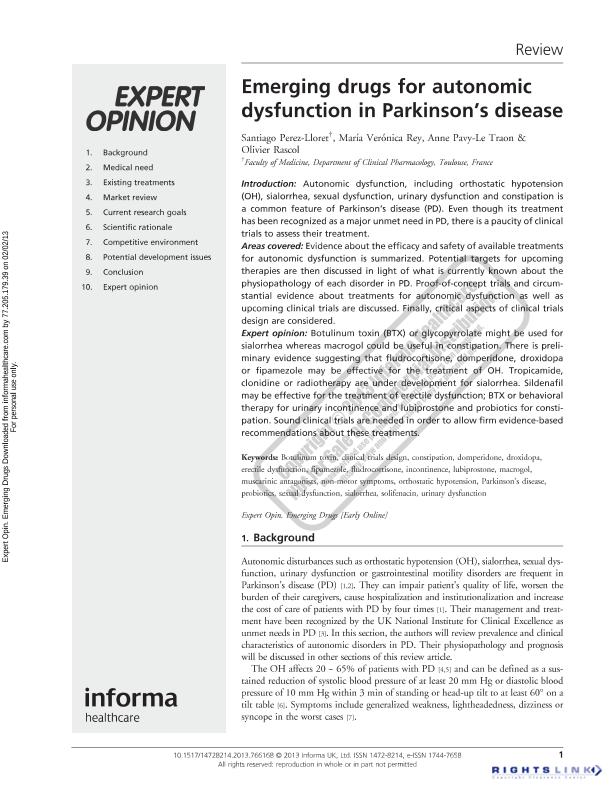Mostrar el registro sencillo del ítem
dc.contributor.author
Pérez Lloret, Santiago

dc.contributor.author
Rey, María Verónica

dc.contributor.author
Pavy Le Traon, Anne
dc.contributor.author
Rascol, Olivier

dc.date.available
2017-09-11T16:58:33Z
dc.date.issued
2013-03
dc.identifier.citation
Pérez Lloret, Santiago; Rey, María Verónica; Pavy Le Traon, Anne; Rascol, Olivier; Emerging drugs for autonomic dysfunction in Parkinson's disease; Taylor & Francis; Expert Opinion on Emerging Drugs; 18; 1; 3-2013; 39-53
dc.identifier.issn
1472-8214
dc.identifier.uri
http://hdl.handle.net/11336/23896
dc.description.abstract
Introduction: Autonomic dysfunction, including orthostatic hypotension (OH), sialorrhea, sexual dysfunction, urinary dysfunction and constipation is a common feature of Parkinson’s disease (PD). Even though its treatment has been recognized as a major unmet need in PD, there is a paucity of clinical trials to assess their treatment. Areas covered: Evidence about the efficacy and safety of available treatments for autonomic dysfunction is summarized. Potential targets for upcoming therapies are then discussed in light of what is currently known about the physiopathology of each disorder in PD. Proof-of-concept trials and circumstantial evidence about treatments for autonomic dysfunction as well as upcoming clinical trials are discussed. Finally, critical aspects of clinical trials design are considered. Expert opinion: Botulinum toxin (BTX) or glycopyrrolate might be used for sialorrhea whereas macrogol could be useful in constipation. There is preliminary evidence suggesting that fludrocortisone, domperidone, droxidopa or fipamezole may be effective for the treatment of OH. Tropicamide, clonidine or radiotherapy are under development for sialorrhea. Sildenafil may be effective for the treatment of erectile dysfunction; BTX or behavioral therapy for urinary incontinence and lubiprostone and probiotics for constipation. Sound clinical trials are needed in order to allow firm evidence-based recommendations about these treatments.
dc.format
application/pdf
dc.language.iso
eng
dc.publisher
Taylor & Francis

dc.rights
info:eu-repo/semantics/openAccess
dc.rights.uri
https://creativecommons.org/licenses/by-nc-sa/2.5/ar/
dc.subject
Probiotics
dc.subject
Parkinson'S Disease
dc.subject
Drugs
dc.subject
Efficacy And Safety
dc.subject
Botulinum Toxin
dc.subject
Clinical Trials Design
dc.subject
Constipation
dc.subject
Domperidone
dc.subject
Droxidopa
dc.subject
Erectike Dysfunction
dc.subject
Fipamezole
dc.subject
Fludrocortisone
dc.subject
Sexual Dysfunction
dc.subject
Urinary Dysfunction
dc.subject.classification
Bioquímica y Biología Molecular

dc.subject.classification
Medicina Básica

dc.subject.classification
CIENCIAS MÉDICAS Y DE LA SALUD

dc.title
Emerging drugs for autonomic dysfunction in Parkinson's disease
dc.type
info:eu-repo/semantics/article
dc.type
info:ar-repo/semantics/artículo
dc.type
info:eu-repo/semantics/publishedVersion
dc.date.updated
2017-09-08T20:21:13Z
dc.journal.volume
18
dc.journal.number
1
dc.journal.pagination
39-53
dc.journal.pais
Reino Unido

dc.journal.ciudad
Londres
dc.description.fil
Fil: Pérez Lloret, Santiago. Consejo Nacional de Investigaciones Científicas y Técnicas; Argentina. Université Paul Sabatier; Francia
dc.description.fil
Fil: Rey, María Verónica. Université Paul Sabatier; Francia
dc.description.fil
Fil: Pavy Le Traon, Anne. Université Paul Sabatier; Francia
dc.description.fil
Fil: Rascol, Olivier. Université Paul Sabatier; Francia
dc.journal.title
Expert Opinion on Emerging Drugs

dc.relation.alternativeid
info:eu-repo/semantics/altIdentifier/url/http://www.tandfonline.com/doi/abs/10.1517/14728214.2013.766168
dc.relation.alternativeid
info:eu-repo/semantics/altIdentifier/doi/http://dx.doi.org/10.1517/14728214.2013.766168
Archivos asociados
